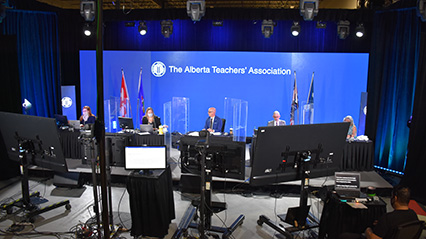Page Content
As anticipated, the Annual Representative Assembly was dominated by discussion and criticism of the government’s curriculum development and rollout.
About 450 delegates met virtually over parts of three days over the May long weekend in order to debate the annual budget of the Alberta Teachers’ Association, debate policy resolutions and hear speeches from organization leaders.
Apart from a motion of non-confidence in Education Minister Adriana LaGrange, curriculum was the most discussed topic. Delegates passed a total of eight curriculum-related resolutions. These included
- a call for the government to ensure that active classroom teachers have a primary role in the curriculum review process;
- a call for a moratorium on curriculum piloting and implementation;
- an affirmation of teachers’ professional responsibility and moral right to refuse to participate in the voluntary curriculum piloting;
- a call for restoration of the agreement that made the ATA a partner in curriculum development;
- a call for the government to delegate curriculum development to an independent, apolitical authority; and
- a call for K–12 curricula to include outcomes related to gender expression, identity and sexual orientation.
“We know the curriculum in its current state is, well, deplorable,” said ATA president Jason Schilling during his address to delegates.
“Nothing about this curriculum is right. The way it was developed, the content, the feedback process, the assessments and resources have all been politicized, and this by a government who swore they wanted to depoliticize the curriculum.”
Curriculum came up often during discussion of the non-confidence motion, which passed with 99 per cent approval.
“It is 2021 and as a racialized person I have never felt seen in the education system,” said one delegate. “I think it will be impossible to fit me and people like me into the new curriculum that this minister thinks is the best curriculum that the government has ever put out.”
Other resolutions of note that passed were a call for school boards to encourage limits on times when teachers are available outside of school hours via electronic communication, as well as resolutions urging the government to
- provide stable and adequate funding to help internationally educated teachers meet Alberta’s teacher certification requirements,
- direct school authorities to explore other methods of instructing students at home prior to implementing synchronous teaching and learning in classrooms, and
- reverse its decision to discontinue funding for the Online Reference Centre. ❚

MARK MILNE
ATA officials manage ARA proceedings from an event production studio in west Edmonton over the May long weekend. It was the second consecutive time that the event was held virtually.
